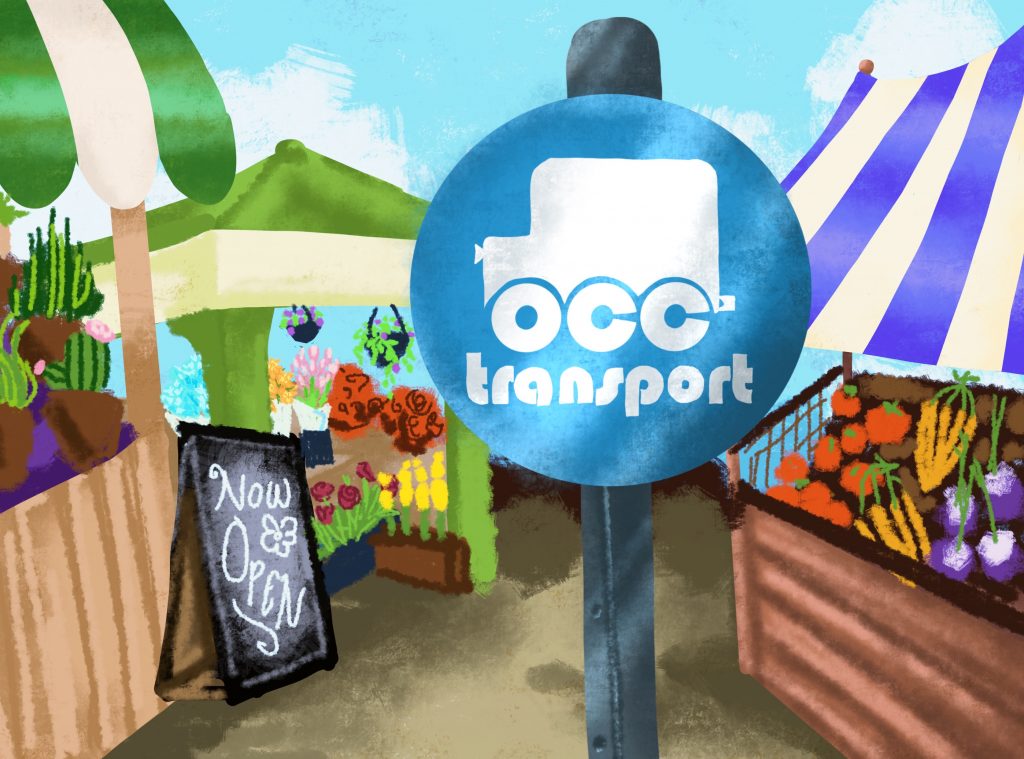For seven upcoming Saturdays, Off Campus College Transport (OCCT), Binghamton University’s student-run, managed and driven bus service, will provide service to the Broome County Regional Farmers Market, allowing students to purchase fresh produce from local vendors. Through the bus service’s charter program, shuttles will run between March 16 and April 27 from 10 a.m. to 1 p.m.
The charter was a collaborative effort between multiple student groups, including Zero Hour Binghamton, the Student Culinary Council (SCC), the Sustainability Hub’s Interest Group, the local chapter of the New York Public Research Interest Group (NYPIRG), 1MReadyBing and Daniel Croce, the Student Association’s vice president of finance (VPF) and a senior majoring in business administration. University partners include the Healthy Campus Initiative and the Kaschak Institute.
The funding was raised through a B-Healthy Initiative grant won by Zero Hour, the Kaschak Institute’s 1MReady Campaign and the SCC, and the initiative is part of a larger effort to increase student food security and make local produce more accessible.
Jacqueline Jergensen ‘23, the Sustainability Hub’s student assistant and a first-year graduate student studying sustainable communities, explained that student organizations have previously been able to charter these shuttles, and this semester, the number of charters was expanded.
“In the past, groups like the [SCC] and the Food Co-Op have been able to fund buses that take students directly to the Broome County Regional Farmers Market through the [OCCT] charter program, but the charters have been limited to only a few times a year due to the high costs,” Jergensen wrote in an email. “Last year, members of the [Sustainability] Interest Group worked together to pool money from their individual student groups and fund [three] bus charters to the farmers market, and this year it was expanded to [seven] bus charters.”
Stephen Corbisiero, the president of environmental advocacy group Zero Hour and a senior double-majoring in environmental studies and geography, described the process involved in securing funding for the charter.
“Securing the B-Healthy grant first required the submission of an application to the Healthy Campus Initiative discussing the details and logistics of chartering the buses to the farmer’s market,” Corbisero wrote in an email. “Along with [Jergensen], who helped me write the answers to the grant application, we had to plan months ahead for the exact dates of the charter, as well as work out the financial side of the charter. Initially, the plan was for Zero Hour to cover 25 [percent] of the grant, but thanks to the generous support of the Kaschak Institute and [SCC], the entire amount of the charter was funded by University offices, which we are extremely grateful for.”
Jergensen expressed her hope that the initiative will continue into the fall semester. She said that the idea was discussed within the Sustainability Interest Group — a student organization that advocates for sustainability initiatives — and acknowledged the contributions of Croce, Corbisero, Alana McKeon, the SCC’s president and a senior majoring in environmental science, and Raissa Bellucci, NYPIRG’s vice president and a senior double-majoring in classical studies and English, in the initiative’s success.
“This money was all brought to [BU SA] and OCCT to organize the bus charters,” Jergensen wrote. “All of these actions were organized through our bi-weekly Interest group meetings at the Sustainability Hub and will be promoted by our members and NYPIRG.”
She added that stakeholders were looking into the possibility of a fall charter, encouraging organization leaders and interested students to lobby SA and OCCT leaders to find a way forward.
Corbisero said the project will allow those without car access to be able to access the market.
“In addition, the initiative promotes sustainability and healthier eating, as students will be able to utilize mass transport to reduce their carbon footprint, while simultaneously having access to a wide variety of healthy, sustainably grown, farm-to-table foods,” Corbisero wrote.



